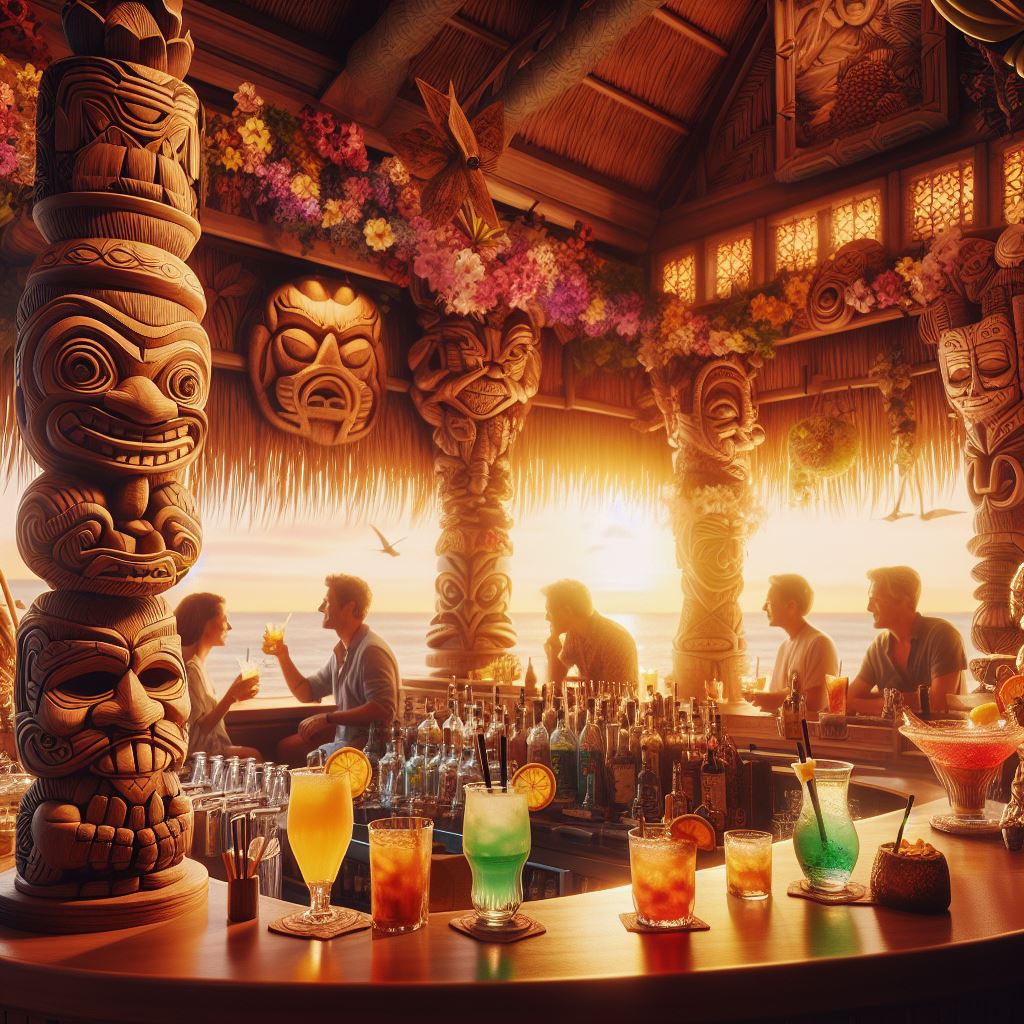The Enchanting Tale of Tiki Bars: A Tropical Escape

Tiki bars, with their alluring promise of an island escape, carved wooden statues, and exotic cocktails, have become a beloved staple in the landscape of American bar culture. Yet, their story begins not on the sandy shores of the South Pacific, but in the imagination and entrepreneurial spirit of two men: Donn Beach and Victor Bergeron. This article delves into the fascinating history of tiki bars, their cultural significance, and their enduring appeal.
Origins of the Tiki Phenomenon
The captivating world of tiki culture in the United States traces its roots back to the 1930s when Don the Beachcomber, a Polynesian-themed bar and restaurant, opened its doors in Hollywood, California. Founded by Ernest Raymond Beaumont Gantt (later known as Donn Beach), this establishment drew inspiration from Gantt’s travels to the South Pacific. His vision was to recreate the tropical ambiance, providing an escape from the daily grind through exotic drinks and decor. Donn Beach is credited with pioneering the tiki bar’s distinctive approach to cocktails, characterized by intricate blends of rums, fresh juices, and syrups adorned with dazzling decorations.
Shortly thereafter, Victor Bergeron transformed his Oakland eatery into Trader Vic’s, another cornerstone of tiki culture. Bergeron significantly enriched the tiki cocktail repertoire, claiming to have invented the Mai Tai, one of the most iconic tiki drinks, in 1944.
The Golden Age of Tiki Bars
The mid-20th century witnessed the golden age of tiki bars and restaurants, coinciding with a post-World War II fascination with the South Pacific. Returning soldiers brought back stories and souvenirs from the Pacific Theater, fueling the American public’s interest in Polynesian culture. Tiki bars offered an idealized and accessible version of these distant lands, complete with bamboo decor, thatched roofs, and flaming torches.
Tiki bars became synonymous with leisure and celebration, often chosen as venues for parties and gatherings. The elaborate tiki cocktails served were not only a treat for the taste buds but also a visual spectacle. These libations featured intricate garnishes, elaborate glassware, and evocative names like the Zombie, the Hurricane, and the Painkiller.
Cultural Significance and Criticism
While widely regarded as a whimsical and fun expression of Americana, the tiki bar phenomenon has faced criticism. Some have raised concerns about cultural appropriation inherent in the borrowing and adaptation of Polynesian aesthetics. Despite this, tiki bars continue to thrive, offering a delightful escape to tropical paradise for patrons seeking a taste of exotic indulgence.
Despite facing criticism, modern tiki bars have taken deliberate steps to engage more respectfully with the cultures that inspire them. These establishments now prioritize authenticity in their use of motifs, artifacts, and recipes. Additionally, they offer educational content about Polynesian history and art.
The Revival of Tiki Culture
After a decline in the late 20th century, the 21st century has witnessed a renewed interest in tiki bars. This resurgence is part of a broader revival of craft cocktails and mid-century modern design. The new wave of tiki enthusiasts embraces the escapism and intricate cocktail craftsmanship of the tiki tradition while remaining mindful of cultural sensitivity and historical accuracy.
Modern tiki bars seamlessly blend traditional elements with contemporary cocktail science. Patrons can enjoy both classic tiki concoctions and innovative new creations. Alongside this revival, there has been a renewed fascination with collecting tiki mugs and artifacts, as well as a growing interest in Polynesian art and dance
The Enduring Allure of Tiki
From its 1930s beginnings to its modern resurgence, the story of tiki bars is a testament to our desire for escape, imagination, and the exotic. They offer a unique blend of cultural inspiration, cocktail artistry, and a welcoming atmosphere. While navigating the complexities of cultural representation, tiki bars continue to hold a special place in our hearts. After all, who can resist a delicious rum concoction served in a whimsical paradise, even if it's just for the length of a drink?
In the context of tiki bars, patrons refer to the individuals who visit and frequent these establishments. These patrons are the customers or guests who enjoy the tropical atmosphere, exotic drinks, and cultural experience that tiki bars offer. They come to tiki bars seeking an escape to a whimsical, Polynesian-inspired paradise, even if only for a drink.


